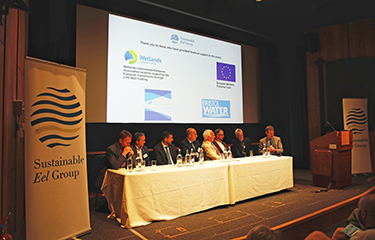Europol announces increased effort to stop European eel trafficking

During a press conference at the Sustainable Eel Group’s 10 Year Anniversary Event, Europol announced that it has seized at least 15 million endangered European eels and arrested 153 smugglers from across the European Union.
The seizures and arrests represent a 50 percent increase in the organization’s enforcement against the smuggling of the endangered European eel. The eel is subject to a number of European regulations, including a blanket ban on all imports and exports and a global restriction on trade. The species was listed under the Convention of International Trade in Endangered Species (CITES), and a complete ban on all exports from the E.U. has been in place for multiple years.
Despite the ban, its estimated that 300 million glass eels (also known as elvers) are trafficked from Europe to Asia each year. The eels are worth roughly EUR 1.00 (USD 1.13) each, making even just a kilogram of glass eels worth thousands of euros. That high value and small size makes the species a prime target for poachers and smugglers, which sometime coordinate in large operations that can pull in tens of millions of euros.
It has been estimated that roughly EUR 3 billion (USD 3.4 billion) worth of eels are being smuggled every year. The eels are trafficked out of the E.U. to Asia, where they are grown into full-sized eels and resold, either within Asia or to the U.S., Canada, and the E.U.
Europol is making efforts to step up enforcement against eel smuggling, given its heavy impact on the recovery of the European eel. Its estimated that 25 percent of the recruitment stock of the eel is being jeopardized by the smuggling operations.
“This is our flagship operation in terms of environmental crime. All the arrests mentioned are in Europe with the majority from Spain, France, and Portugal,” Jose Moreno of Europol said. “The main actions have been taken from SEPRONA, [Spain’s Nature Protection Service]. They have led the way in Europe, along with the Portuguese and French authorities.”
Authorities are now using DNA to determine whether adult eel products had origins in Europe, helping to track down which operations are involved in smuggling and growing European eels.
“We have focused not just looking at trafficking glass eels as a single issue, but the wider criminal networks,” Moreno said. “Year after year, more countries are joining our actions. For example, this year we are carrying out more work in Croatia, Czech Republic, Germany, Switzerland, and Macedonia. For the next season, we want to follow the line of the inquiry into eel meat production in Asia and DNA traces. With this, we expect more countries to get involved with high ambition for action.”
While the effort has helped curtail some of the smuggling, more is still needed to help save the European eel, according to the Sustainable Eel Group.
“Trafficking of the European eel is the world’s great wildlife crime in both traded individuals and market value,” Andrew Kerr, chair of the group, said. “It affects 25 percent of the total stock of European eel and is hampering the recovery of this precious species. It is therefore vital that we stop all smuggling because it undermines every single effort used to establish adequate protection from other human impacts.”






Share